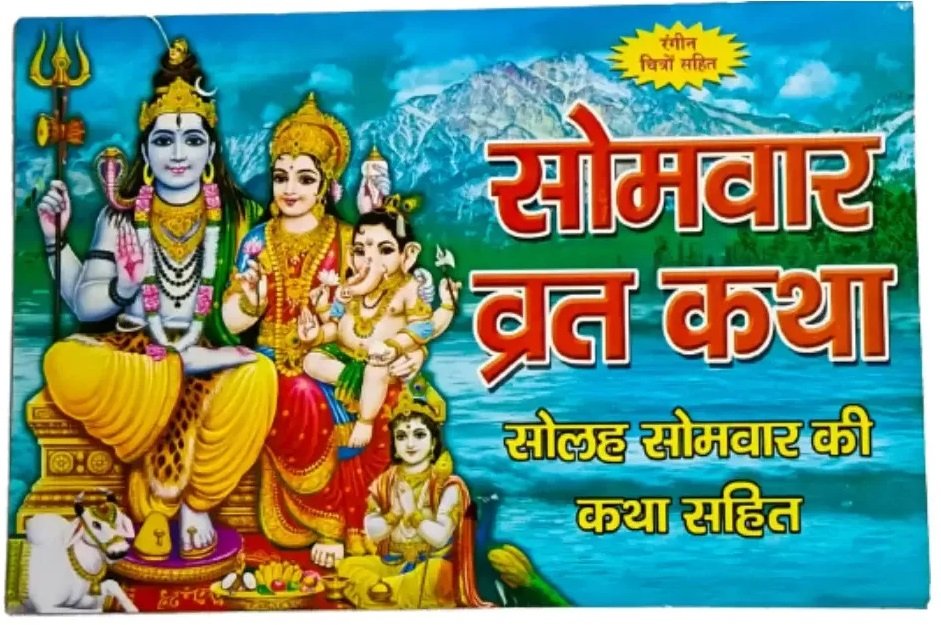The 16 Somvar Vrat, performed on Mondays, is dedicated to Lord Shiva. This sacred observance holds great significance, especially for those seeking blessings for health, prosperity, or marital happiness. Devotees follow this ritual for 16 consecutive Mondays, performing fasting, prayer, and other acts of devotion. The 16 Somvar Vrat Katha Book plays an essential role in this tradition, offering stories and wisdom to guide followers through the process. This article delves into the importance of the 16 Somvar Vrat, the Katha book’s content, and why it holds such a revered place among devotees.
Table of Contents
ToggleWhat is the 16 Somvar Vrat?
The Somvar Vrat is a ritual observed on Mondays to worship Lord Shiva. The 16 Somvar Vrat spans 16 Mondays, and each Monday, devotees fast and perform special prayers. Many people believe that following this vrat brings fulfillment of their desires, especially in health, relationships, and prosperity. Though this ritual is common across India, it is especially popular among women who hope for marital bliss or a happy life. The practice’s spiritual significance is profound, as it represents devotion to Lord Shiva and the pursuit of well-being.
The Role of the 16 Somvar Vrat Katha Book
The 16 Somvar Vrat Katha Book is central to the observance of this ritual. It contains stories and legends that inspire devotion, patience, and faith. These stories emphasize Lord Shiva’s grace and the importance of following the vrat diligently. The Katha book serves not only as a spiritual guide but also as a source of encouragement during the fasting period. Every Monday, devotees read a portion of the Katha, which reinforces the teachings of Lord Shiva and helps deepen their devotion.
How the Katha Supports Devotees
The Katha or story in the book reminds followers of Lord Shiva’s divine interventions. Each Monday, as devotees read a part of the Katha, they learn lessons of patience, dedication, and spiritual growth. These stories reassure the followers that their devotion will not go unnoticed, and they can expect blessings in return.
The Content of the 16 Somvar Vrat Katha Book
The 16 Somvar Vrat Katha Book consists of several stories that demonstrate the benefits of observing the vrat. These stories feature characters who receive blessings for their unwavering faith in Lord Shiva. Here are some key stories found in the book:
The Story of King Satyarath
One of the most famous stories in the Katha is about King Satyarath, who was childless for many years. The king performed the 16 Somvar Vrat after consulting sages, and he observed the rituals sincerely. After 16 Mondays, Lord Shiva blessed him with a son. This story teaches the value of persistence in devotion and faith in Lord Shiva’s grace.
A Devotee’s Faithful Journey
Another story highlights the journey of a poor devotee who struggled financially. Seeking solace, he turned to Lord Shiva and began observing the 16 Somvar Vrat. Despite his hardships, he remained committed. After completing the 16 Mondays, his life transformed, and his fortunes improved. This story serves as a reminder that Lord Shiva rewards those who worship with true devotion, no matter their financial or social status.
The Significance of Fasting and Praying
The Katha also emphasizes the spiritual benefits of fasting. Devotees believe fasting cleanses both the body and mind. In the stories, fasting is not seen merely as a physical act but as a way to purify the spirit. By fasting and praying, devotees align themselves with divine energy, which helps them overcome obstacles in life.
The Reward of Sincere Devotion
A common theme in the 16 Somvar Vrat Katha Book is that devotion and faith lead to rewards. The book highlights stories where individuals faced challenges, whether health-related, financial, or emotional. Their commitment to Lord Shiva’s worship brought healing, prosperity, and happiness into their lives.
Using the 16 Somvar Vrat Katha Book
The 16 Somvar Vrat Katha Book is meant to be read over the course of the 16 Mondays of the ritual. Each Monday, after performing the fast and the worship rituals, devotees read a part of the Katha. This keeps them connected with the divine teachings of Lord Shiva and reinforces their dedication to the vrat.
Rituals to Follow During the Vrat
The observance of the vrat involves specific rituals. Devotees wake early on Monday, bathe, and wear clean clothes. They offer flowers and fruits to Lord Shiva and may also perform the Shiva Abhishekam by pouring water over the Shiva lingam. Fasting is an essential part of the vrat, and devotees refrain from consuming food, although some choose to have a light vegetarian meal.
Throughout the fasting period, the devotee remains focused on Lord Shiva, offering prayers and reading from the Katha book. The devotion of the individual is key, as the stories in the Katha emphasize that it is not the rituals alone, but the sincerity behind them, that brings blessings.
Conclusion
The 16 Somvar Vrat Katha Book serves as both a spiritual guide and a source of inspiration for devotees following the Somvar Vrat. The stories within the book illustrate the transformative power of dedication, fasting, and prayer. They show that true devotion to Lord Shiva leads to spiritual and material rewards. For those seeking blessings and guidance in their lives, the 16 Somvar Vrat Katha is a powerful tool for connecting with Lord Shiva’s divine energy.
In this revision, I have reduced the use of passive voice and shortened sentence lengths, making the content more direct and engaging.
